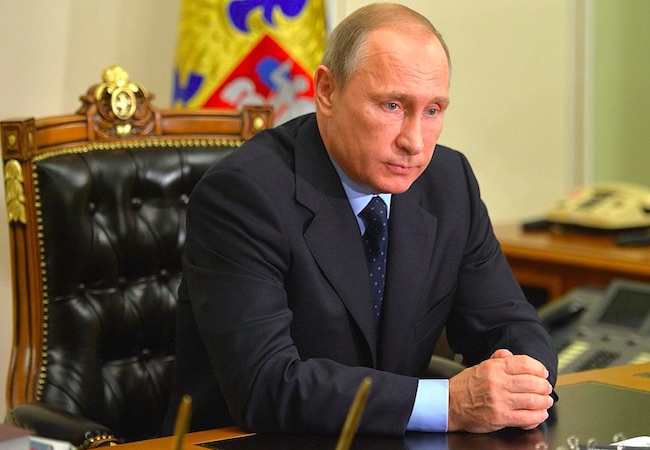Humanitarian intervention and information warfare

Dr. Stephen Blank
The necessity for humanitarian intervention remains compelling. One look at conditions in Venezuela confirms that somber assertion. But Venezuela and too many other previous cases confirm that humanitarian intervention has long since been politicized. Relief of the suffering is rarely disinterested. Cases like the Armenian Earthquake of 1988, the Tsunami in the Indian Ocean in 2004 and the Fukushima nuclear reactor crisis of 20111 are atypical while cases like Venezuela, where the government is blocking humanitarian aid from across the globe to stay in power, are quite typical.
In fact we could say that Venezuela, like other examples of humanitarian crisis, including the ones listed above, displays the need for independent agencies who can move cargoes quickly and without interference to stricken areas under the auspices of disinterested actors like the UN. Though their work is unheralded, it clearly possesses great importance. But we also now see that states like Russia are trying to undermine the independence of such carriers. Starting in 2017 Russian trolls have disseminated a steady stream of fake news and disinformation alleging that independent companies like the Frankfurt and Baku based Silk Way Airlines and the Virginia based Purple Shovel firm are transporting weapons to terrorists all over the Middle East at the behest of the U.S. CIA, U.S Special Operations Command, Israel, Sweden etc. This attack on these companies did not occur by accident as these episodes of fake news have been traced back to Moscow and Yerevan both of whom are interested in undermining a company based in Baku and firms that are contractors for both the U.S. and UN but do not ship weapons let alone support terrorism.
The political motives involved in these disinformation campaigns are obvious. They resuscitate the old KGB canard about the U.S. supporting terrorists to hide Russia’s support for terrorists across the globe like the Taliban, Hezbollah, Kurdish terrorists in Turkey, the Iranian government, the FARC in Colombia, and Russian-backed terrorists in Ukraine, etc. As in classic information warfare, they seek to replace the truth with confusing narratives that discredit everyone and inhibit action against Russia. Armenia too, obviously wants to discredit an Azeri company given its ongoing “frozen conflict” in Nagorno-Karabakh. So both Armenia and to a greater extent Moscow have transparently political aims even if the methods are not new. Indeed, these episodes of disinformation conform to the long-established pattern by which Moscow disseminates fake news through forgeries and unproven assertions, employs a troll willing to publish these canards, and then bootstraps the original lie into a bigger one that gets magnified through the global media thanks to its megaphone or “firehose of falsehoods.”
However this example of information warfare against corporations has other aims that are no less injurious to the need for effective humanitarian intervention capabilities. The aim of these and other attacks on corporations is to undermine their reputation and credibility making it difficult for them to secure new financing or undertake existing contracts due to the opprobrium attached to these allegations. Obviously nobody will support firms running guns to terrorists. Ultimately if contracts and financing dry up these companies go under, opening the way to Russian companies to replace them like Volga-Dnepr’ Airlines that is implicated along with the Russian government in this campaign. This kind of corporate raiding is the norm in Putin’s Russia. It has even spawned a new Russian word “Reiderstvo”, i.e. raiding to describe it. We see here an attempt to export or internationalize this tactic to gain control of the lucrative international logistics and cargo business.
But it is not just a question of money. Viktor Bout, the notorious arms dealer who was linked to the GRU (Russian military intelligence) hid his business behind a front of international cargo trafficking, which presented a legal cover for his activities. This Mafia-like money laundering allowed him and others like him to carry out covert and clandestine operations behind a seemingly legal façade. Much like Vito Corleone’s olive oil importing business the cargo business, in the wrong hands, e.g. Volga Dnepr’ and Moscow, can easily become a front for carrying out criminal and covert missions on behalf of Moscow and its allies.
Indeed we have just seen Moscow swoop in take a billion dollars of Venezuela’s gold reserve, sell it abroad, and return the cash to the Maduro government whose corruption makes even Russians blanch. So this kind of information warfare can have serious political and human repercussions by denying people aid or using the UN banner to conceal “black operations.”
To combat such cases of corporate information warfare we need public and private cooperation but also rapid exposure of the forces behind it. As Justice Brandeis observed “sunshine is the best disinfectant.” Russia and its allies are not just targeting government, society, and military targets. They are also attacking key economic targets like electric grids and international logistics firms. They aim to undermine the US, UN, and other governments, and effectuate what amounts to a criminal takeover of corporations for profit and political gain. Like it or not the information war has spread to this sector and we must defeat it there as well as elsewhere.
Dr. Stephen Blank is a Senior Fellow at the American Foreign Policy Council




